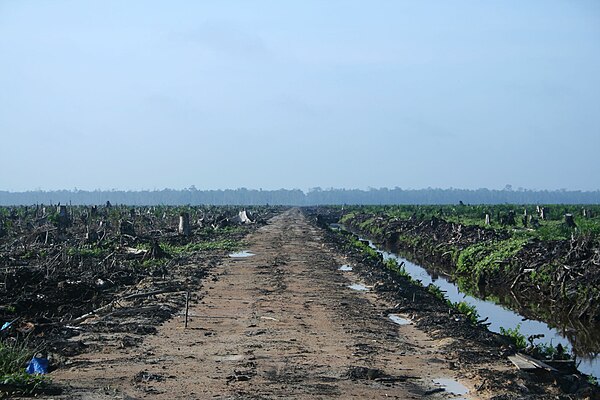II. Environmental Issues in Indonesia and Colonial Rule
Climate Change
Indonesia occupies a special position in responding to climate change as a fossil-fuel exporting archipelagic nation with an abundance of carbon-capturing rainforest. The capital city, Jakarta, the second largest urban area on Earth and home to over 35 million people, is already fighting against the Java Sea. The city is sinking due to ground water depletion, necessitating a system of levees to protect neighborhoods, and is further threatened by rising sea levels. The government has launched an ambitious mega-project to relocate the seat of government to the planned city of Nusantara in East Kalimantan on Borneo. Many of the outer islands also face similar risks and challenges.
The government, as part of its Nationally Determined Contribution under the Paris Climate Agreement, has a net zero carbon emissions target date of 2060. Managing deforestation is key to this initiative. Nearly 70 percent of Indonesia is categorized as “forest estate,” managed generally by the Ministry the Environment and Forestry with some overlapping authority of the provincial governments. Formerly, the Ministry of Forestry and the Ministry of the Environment were separate departments, with the Ministry of the Environment governing without a portfolio, but the two ministries were combined in 2014 in part to give greater voice to environmental concerns in forest management. Article 33(3) of the Constitution declares, “The land, the waters and the natural resources within shall be under the powers of the State and shall be used to the greatest benefit of the people.”
Agreement, has a net zero carbon emissions target date of 2060. Managing deforestation is key to this initiative. Nearly 70 percent of Indonesia is categorized as “forest estate,” managed generally by the Ministry the Environment and Forestry with some overlapping authority of the provincial governments. Formerly, the Ministry of Forestry and the Ministry of the Environment were separate departments, with the Ministry of the Environment governing without a portfolio, but the two ministries were combined in 2014 in part to give greater voice to environmental concerns in forest management. Article 33(3) of the Constitution declares, “The land, the waters and the natural resources within shall be under the powers of the State and shall be used to the greatest benefit of the people.”
A dominating concern of environmental activists has been forest concessions to agricultural enterprises for growing palm trees and refining palm oil, which western multinational corporations hungrily import to satisfy consumer’s diet for processed foods. I spoke recently with Mr. Roni Saputra, the Litigation Director of environmental non-profit Auriga Nusantara, about the scope of corruption in the palm oil industry and his organization’s strategy for bringing corrupt and/or questionable forest leasing and contracting practices to light. He told me about some interesting cases his group is pursuing in American courts to prosecute American corporations for paying bribes to Indonesian officials for access to palm oil concessions.
Indonesia is a signatory to the Paris Climate Agreement with the goal of unconditionally reducing climate emissions by 29% by 2030 with an even more aggressive target of 41% conditioned on international assistance. Indonesia is committed to net zero emissions by 2060. Indonesia has agreed to reducing emissions from deforestation and forest degradation (REDD) and is working under a Letter of Intent with Norway to receive $1 billion in incremental payments in exchange for reduced deforestation. Implementation has been slow, and Norway’s payments have been held up for what Norway considers a lack of demonstrable progress in addressing deforestation. Recently, the European Union has passed more punishing trade measures, adopting a deforestation-free resolution requiring palm oil importers to certify that their products are not derived from illegal logging.
Dutch Colonial Rule
The Dutch Republic emerged in the 17th century from its struggle for independence from the Spanish Habsburgs as a maritime power with investors eager to stake a claim to coveted commodities in what they called the East Indies. Clove and nutmeg could be purchased cheaply in the Molucca Islands and sold at fabulous profits in European markets. The States General of the Netherlands chartered the Dutch East India Company (VOC) in 1602 to establish a monopoly on the spice trade, authorizing the Company to recruit armies, negotiate with local rulers, and build fortifications to protect their trade.
The Dutch committed many atrocities asserting their newly proclaimed turf and protecting it from rivals, seeking to edge out the Portuguese and other competitors. When the Bandanese in the Molucca Islands resisted a Dutch instruction to sell only to the VOC, the Company killed and enslaved thousands between 1609 and 1621. To improve their position and neutralize challenges to their growing power, the Company became increasingly involved in local political affairs. In the 18th century, the Company intervened in a series of succession and factional conflicts of the Mataram Sultanate in Java, establishing itself as the patron and kingmaker to a divided nobility.
The VOC went bankrupt at the end of the 18th century, after some 200 years of paying healthy dividends to shareholders without a corresponding increase in profits to distribute, and the Dutch government assumed control of the Dutch East Indies. The pattern of divide-and-conquer continued under the new system of administration. Here in West Sumatra, the Dutch intervened in the Padri War in the early 19th century on behalf of adat leaders resisting a fundamentalist religious insurrection. At the conclusion of the war, the Dutch were firmly settled in fortifications in West Sumatra and demanded the cooperation of the Minangkabau leaders in the Dutch trade system. In later draining military expeditions, the Dutch conquered the Aceh Sultanate and the Balinese Rajas.
The administration of the Dutch East Indies has been called in Dutch a wingewest, a region exploited for profit, the focus of imperial functionaries being to optimize commodity returns with only a bare minimum of local reinvestment for governing purposes. In the 1830s, having lost Belgium and feeling their coffers drained, the Dutch gave their governor-general the mission of squeezing more revenue out of their colonial subjects. Land under colonial administration, principally in Java, was subjected to a “cultivation system” wherein villages were forced to dedicate 20% of their land to growing cash crops for export or providing corvee-style labor for Dutch plantations. Exports to Europe grew considerably while Indonesian cultivators suffered great deprivation and humiliation. The system lasted until 1870.
At the turn of the 20th century, Dutch entrepreneurs and investors began making fortunes off Indonesian oil, coal, and rubber, touchstones of an increasingly mechanized European economy and society. The Royal Dutch Petroleum Company, founded in 1907, sunk its first well in North Sumatra before merging with the British Shell Transport and Trading Company. Near Padang, in Sawah Lunto, there is a coal mine called Ombilin where the Dutch used chained convict labor to mine up to 620,000 tonnes of coal a year. To transport Indonesia’s mineral wealth, the Dutch built a railroad over the challenging terrain of the West Sumatra mountains, which they connected to the port they called Emmahaven that now serves Padang as Teluk Bayur.
Indonesian oil, coal, and rubber, touchstones of an increasingly mechanized European economy and society. The Royal Dutch Petroleum Company, founded in 1907, sunk its first well in North Sumatra before merging with the British Shell Transport and Trading Company. Near Padang, in Sawah Lunto, there is a coal mine called Ombilin where the Dutch used chained convict labor to mine up to 620,000 tonnes of coal a year. To transport Indonesia’s mineral wealth, the Dutch built a railroad over the challenging terrain of the West Sumatra mountains, which they connected to the port they called Emmahaven that now serves Padang as Teluk Bayur.
The Dutch implemented a civil and criminal code for the Dutch East Indies within the context of a legal caste system. The civil and criminal courts had jurisdiction over matters concerning the European legal class. The local population remained largely subject to customary adat law. Adat law somewhat defies categorization under western legal thinking. Partially, this is because of the huge diversity of customary traditions. But it is also sometimes difficult to map to adat the rights and obligations derived from something like a European civil code.
Indonesia has sometimes been described as not very friendly to foreign investors and businesses, appearing lower on such things as the World Bank ease of doing business index. There are a lot of regulatory layers, and some of these may be duplicative or require companies to deal with overlapping and confusing authorities. State owned enterprises are powerful, and foreign companies may complain about an uneven playing field. The current President and DPR have been attempting to deal with this perception and attract foreign direct investment, hoping to promote economic growth, through an omnibus “Job Creation Law,” which I will discuss shortly. But some skepticism towards foreign companies seems understandable and probably healthy given their overpowering history in Indonesia.
Environmental Concerns in the 2020 Omnibus Law
Forestry officials are trusted as gatekeepers for very lucrative concessions from the government, and keeping public servants honest is an ongoing struggle. But environmental activists have also expressed concern with changes to environmental regulations in the omnibus Law No. 11 of 2020, known as the Job Creation Law, which was passed by the DPR with the approval of President Joko Widodo. As the vague title, familiar to many American omnibus laws, suggests, the purpose of the measure is to jumpstart economic growth with business-friendly regulatory reforms.
After the law was passed in October 2020, trade unions mobilized and held massive demonstrations, objecting to changes to minimum wage and severance laws and reduced penalties for wage theft. Environmental activists complained about how the law changes business licensing and how the government conducts environmental impact assessments (AMDAL). The Minister of the Environment and Forestry has stated quite clearly that new law contemplates lesser involvement of environmental NGOS in the AMDAL process and related administrative decision-making, arguing that “the interests of directly impacted local communities have often been diluted by indirect outside interests.”
Environmental organizations have challenged the constitutionality of the revised AMDAL articles of the Job Creation Law, but the Constitutional Court in Decision No. 91/PUU-XVIII/2020 conditionally invalidated the law for violating lawmaking principles in the Constitution of 1945, making review of the substantive articles moot. Article 22A of the Constitution declares, “Further provisions regarding the procedures to establish laws shall be regulated by law.” In conditionally invalidating the Job Creation Law, the Court focused on the lack of an accessible public draft prior to passage, whereas Law No. 12 of 2011 provides that access to laws is mandatory to facilitate public feedback.
The Court gave the DPR two years to repair the law. In the meantime, the President issued an emergency regulation to replace the Job Creation Law. In March, the DPR passed a revised version of the Job Creation Law, Law No. 6 of 2023, with renewed petitions to the Constitutional Court seeking to review its provisions. As part of my research this summer, I am comparing the omnibus laws and legislative practice in the United States, focusing on how these impact substantive environmental regulation.